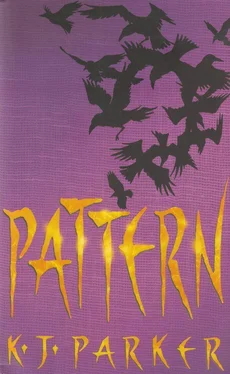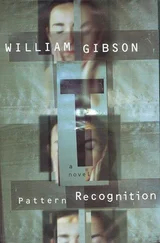K Parker - Pattern
Здесь есть возможность читать онлайн «K Parker - Pattern» весь текст электронной книги совершенно бесплатно (целиком полную версию без сокращений). В некоторых случаях можно слушать аудио, скачать через торрент в формате fb2 и присутствует краткое содержание. Жанр: Фэнтези, на английском языке. Описание произведения, (предисловие) а так же отзывы посетителей доступны на портале библиотеки ЛибКат.
- Название:Pattern
- Автор:
- Жанр:
- Год:неизвестен
- ISBN:нет данных
- Рейтинг книги:3 / 5. Голосов: 1
-
Избранное:Добавить в избранное
- Отзывы:
-
Ваша оценка:
- 60
- 1
- 2
- 3
- 4
- 5
Pattern: краткое содержание, описание и аннотация
Предлагаем к чтению аннотацию, описание, краткое содержание или предисловие (зависит от того, что написал сам автор книги «Pattern»). Если вы не нашли необходимую информацию о книге — напишите в комментариях, мы постараемся отыскать её.
Pattern — читать онлайн бесплатно полную книгу (весь текст) целиком
Ниже представлен текст книги, разбитый по страницам. Система сохранения места последней прочитанной страницы, позволяет с удобством читать онлайн бесплатно книгу «Pattern», без необходимости каждый раз заново искать на чём Вы остановились. Поставьте закладку, и сможете в любой момент перейти на страницу, на которой закончили чтение.
Интервал:
Закладка:
(Bizarre, Poldarn thought. A man could go away for forty years and come home blind, and still be able to find his proper place at table by memory alone.)
At exactly the same moment as the benches slotted into place, Rannwey and five other women came through the doorway from the kitchen, carrying enormously long wooden trenchers, on each of which rested a colossal loaf. One loaf went to each table, perfectly centred-Poldarn knew without having to try the experiment that if he took a piece of string and measured, he'd find each crust-end of each loaf was definitively the same distance from the table's two top corners-while a gaggle of young boys followed on, each with an armful of wooden plates. Behind them came older boys and girls carrying wicker baskets clinking with cutlery-horn spoons, looted silver forks from the Empire, plain twisted iron forks from Asburn's forge, a jumble of misplaced heirlooms stolen out of other people's lives and practical home-made implements, all function and no history. By the time they'd finished setting the places, Rannwey and her party were back with earthenware beer-jugs, and as they returned to the kitchen they passed the boy-and-girl platoons on their way back with wooden and horn cups and beakers. Each item stood square on its mark like a runner at the start of a race, none of them so much as a finger's breadth out of line (as if standing a trifle to one side or another was likely to constitute an unfair advantage when the starting-flag fell). A place for everything, everything in its place. Perfection, even.
There was a heartbeat, two at most, dividing the setting down of the last mug and the entry of the first batch of farmhands, ready to take their seats. Poldarn recognised them as the long-barn crew: Eutho, Halph, Simmond and his twin brother Seyward-they worked furthest from the house, so presumably there was some kind of logic to their sitting down first. Next came Carriman and Osley from the stables, and after them Raffen, Olaph, Eyvind and his men (as long-term guests, apparently, they counted as honorary members of the trap-house crew); and so on, each outbuilding reproduced exactly as a grouping inside the house, until at the end Halder and Rannwey took their places in the centre of the middle table, and everybody pulled out their knives-alarming sight if you weren't used to it-and started carving up the long loaves.
At this point, Poldarn realised he should be sitting down, too. There was a place for him, of course, opposite Halder, an expanse of bench precisely the same width as his backside.
'There you are,' Halder said as he sat down. 'You're filthy.'
There didn't seem to be much Poldarn could say to that, apart from 'Yes'. Instead, he reached for the bread. There was one slice left, opposite his hand.
The young boys were back, this time with dishes of roast meat and round, flat bowls full of boiled leeks, baked apples, onions. A small mountain of food appeared on Poldarn's plate, filling up all the space not already taken up with bread. His cup had somehow filled itself with beer. Just as well-he was starving.
Halder had speared a small whole onion with the point of his knife, and was nibbling his way round it, like a squirrel. It occurred to Poldarn to wonder whether he'd done the same thing yesterday and the day before; there had to be some pattern to the actual eating of the food, or the whole business wouldn't make sense. He made a mental note to observe, over the next week or so. There were important questions to be asked: did everybody start with, say, the leeks, then the onions, then the apples, then the meat and finally the bread? How many mouthfuls of food did they take in between sips of beer? Did each individual have a degree of discretion as to which side of the plate he started from, or was there an orthodoxy about that, too? The night before last he'd caught someone on the table below staring at him in wonder as he ate a slice of beef; was this because he'd eaten it before he'd finished his onions, or because he'd gone six mouthfuls without a drink? If all else failed, of course, he could even grit his teeth and ask somebody; but it hadn't reached that point yet, as far as he could tell.
Six tables of hungry people eating together can't help but produce a certain volume of noise, but nobody was talking. This was another aspect of the ritual that Poldarn found somewhat oppressive, since it seemed fairly natural to him that mealtimes were a good opportunity for relaxed conversation, in the course of which he could ask useful questions without everybody suddenly going dead quiet and staring at him. But the man on his left, Raffen, and the woman on his right (whose name escaped him for the moment) were bent over their plates like clockmakers engraving a face, giving their full attention to the job in hand; if he tried to start a conversation, the shock might make them swallow something the wrong way and choke. At the very least, they'd probably lose their places and have to start the whole meal over again.
Never mind, Poldarn reflected; it was very good roast beef, and he hadn't had to kill anyone to get it. The beer was good too, although it disconcerted him slightly when he drained his cup only to find a serious-faced child standing over him, waiting to fill it up again.
After the main meal had been eaten (another point to check: did everybody finish eating at the same time?) the girls came round with slices of cheese, plums and fat red grapes, and a second refill of beer found its way into Poldarn's cup while his attention was distracted. Apparently cheese-and grape-eating wasn't such a serious business as putting away leeks and roast beef, because Poldarn could distinctly hear voices all around him-just one or two words, but speech nonetheless. He looked up from his plate to find Halder looking straight at him.
'Tomorrow,' Halder said, 'we'll go and take a look at your wood.'
That actually meant something to Poldarn: the memory burst out, like steam off the mountainside. He remembered quite clearly that on the day he'd been born, in accordance with the proper procedure, Halder and the middle-barn crew had planted out a stand of white ash down where the river curved round the side of the hill that marked the end of the combe. The idea was that when the time came for Poldarn to build his own house, those trees would be exactly ready. Although he hadn't been that far away from the farm buildings since he'd been back, he could picture the plantation perfectly clearly in his mind. He could see Halder, thirty years younger, strolling along beside him, pointing out which sapling would one day be his roof-tree, which were to be the joists, the door timbers, the great and lesser sills, the girts and the braces. At the time Poldarn remembered feeling a great surge of comfort and safety that came from knowing that everything was laid out ready for him, through every step of his life-there'd be no doubt or uncertainty, all he had to do was go forward, and everything he'd ever need would be waiting for him, ready in its appointed place, where he could reach out for it without even having to stretch.
'Good,' he replied. 'I'd like that.'
'You remember the time we went there when you were a kid.' It wasn't a question.
'I was thinking about it just now,' Poldarn replied. 'I don't suppose it looks anything like that now, though.'
'Pretty much the same,' Halder said, 'except the trees are bigger. Oh, and we lost one of the middle girts in a storm about fifteen years ago, but I know where there's a beech that'll drop in there just sweet.'
Poldarn nodded. 'That's good,' he said. 'Now I'm trying to remember where the house is going to go. I'm sure we went there that day.'
Halder actually smiled. 'That's right,' he said. 'Twenty paces south-east from the roof-tree, there's a rap of level ground with a good clay footing. First time I came here, it was touch and go whether I built my house there or here, but I chose here, because the other site-yours-is a bit more sheltered and closer to the water; and there's a fine little pool under some rocks for your washing-hole. Actual fact, I had Raffen and Sitrych clear the weeds out, winter before last.'
Читать дальшеИнтервал:
Закладка:
Похожие книги на «Pattern»
Представляем Вашему вниманию похожие книги на «Pattern» списком для выбора. Мы отобрали схожую по названию и смыслу литературу в надежде предоставить читателям больше вариантов отыскать новые, интересные, ещё непрочитанные произведения.
Обсуждение, отзывы о книге «Pattern» и просто собственные мнения читателей. Оставьте ваши комментарии, напишите, что Вы думаете о произведении, его смысле или главных героях. Укажите что конкретно понравилось, а что нет, и почему Вы так считаете.












